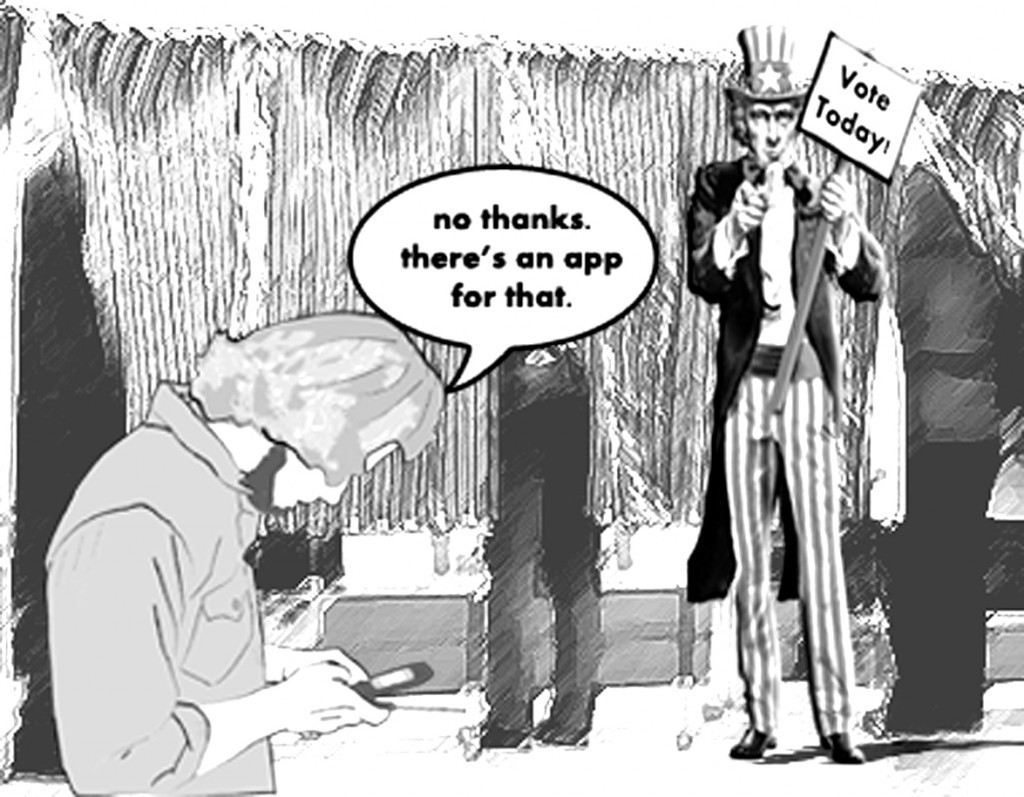The days when summer meant lounging by the pool with friends and the occasional lifeguarding shift or babysitting job are long gone for most college students who struggle to find internships for their summer vacations.
As a junior at Ohio Wesleyan, the pressure to acquire an internship for the summer is constant, however, this pressure increases greatly during the spring semester.
Internships are tricky for multiple reasons. The ability to even be considered for one relies heavily on your connections and who you know, making it difficult for a student who is well qualified but ill-connected to obtain one. Internships are also almost always full of dull administrative work and even are unpaid or only for academic credit, which can make the task of interning seem more like a duty than an interesting way to gain experience.
Typically, students don’t hear of whether or not they receive an internship until April or May, causing students to have little idea of what they’ll be doing for the summer for nearly a third of the academic year, which, from personal experience, can leave one stress ridden about their impending future.
Spending your summer alphabetizing files or getting coffee for your boss for free makes the entire concept of an internship very unappealing, however, it is a necessary in order to ‘bulk up’ a resume.
Internships are only one way for companies to see what you excel at or the skills you have. However, obtaining internships may make a student feel more at ease about their future.
Summers that used to be looked at as a time of leisure, friends and the beach are now stress-filled eight-hour days spent struggling to be the best possible intern in order to receive the best possible reference.
So whether your are stressing over the daunting application and interview process or dreading returning to the same office you interned for last summer, remember to make time to enjoy yourself.
As college students cramming for exams and writing term papers, we should still try to enjoy this time at OWU because as those who have interned before know, the tasks of making 500 copies and getting everyone at the office’s coffee orders right are just as treacherous.
Category: Opinion
Also, see Soapbox
Sound Off OWU: What are your thoughts on Lloyd and Hello Goodbye performing at Crossroads?
Cartoon of the Week: March 29, 2012
Invisible Children has visible flaws
Earlier last week on my way into the Thomson store, I tore down a flier.
This flier was for the screening of “Kony 2012,” a documentary created by the organization “Invisible Children.” This documentary should be screened on campus today.
It was only after tearing down the flier, which showed the merchandise that will be sold at the screening, writing some statistics on the back of it and then hanging it back up that I realized I was engaging in censorship – which is something I really do not support.
So, instead of continuing to tear down these fliers, I will explain my difficult and conflicting feelings about this documentary in a more constructive way.
Invisible Children is an organization dedicated to drawing attention and raising awareness of the Lord’s Resistance Army – a theocratic military group in Uganda, which is comprised of abducted children that are oftentimes abused, sexually assaulted and forced to kill their own families. Invisible Children calls for the U.S. to begin a military intervention in Central Africa in order to put an end to the LRA and its leader Joseph Kony.
The film, which is about 30 minutes long, was released and spread across the Internet in a virulent fashion, making its way across Facebook, Tumblr, Twitter and various other social media websites in a matter of days.
As of March 24, the video has over 85 million views on Youtube.
In the film, the director and co-founder of Invisible Children, Jason Russell, details his experience in Uganda, learning about the LRA from survivors.
After people saw this film, it seemingly became a race not only to make others aware of Kony, but also to make others aware that they were aware of him. Facebook statuses shared the link to the film and called for action against this man’s diabolical behavior.
Conveniently, Invisible Children makes it known in their documentary that, to truly dedicate yourself to the cause, you can order an “action kit,” which contains posters, stickers, buttons and other publicity materials.
It costs thirty dollars. But to many, thirty dollars was a reasonable price to pay in order to “make Kony famous.”
People, mostly college students, began to organize rallies in their communities under the slogan, “Cover the Night.” People come together to rally against Kony in order to, yet again, raise more awareness.
It seems that people love to make other people aware of things. At the very least, they like to make people aware that they are aware of things and that other people should be aware of it, too. We feel if we make other people aware of something bad that is happening, maybe they will do something about it.
This is not to speak against awareness campaigns, but there is something to be said about this never-ending, ineffectual cycle. What, exactly, does raising awareness accomplish?
Unfortunately, awareness campaigns fall prey to what social psychologists would call “diffusion of responsibility,” which, in layman’s terms, is when the sense of responsibility to take action in a scenario is diffused amongst a group because “someone else will do it.”
What I can assure you is that funneling your money into “action packs” will do almost nothing to benefit the children of Uganda, and here is why.
According to Visible Children, an anti-Invisible Children blog, the company has spent only 33 percent of its $8 million dollars in spending on “direct services” – and by that, of course, they mean the children. This means that the thirty dollars you shell out from your small paychecks working as a student on or off campus or from your parents’ wallets may never even see the continent of Africa.
Invisible Children is also a fan of the Ugandan army: which is notorious for raping, pillaging and abusing civilians, according to Human Rights Watch Africa.
As if the financial disparities are not enough, we also have to confront the fact that some of the information within the documentary itself is not factual.
For example, Russell states that the LRA has over 3,000 children in its ranks. According to most documents it currently has around 250 and has not had thousands of children since 2007, if ever.
A quick Google search will show you how Russell has been reacting to the emergence of all these figures and criticisms of his campaign.
These are the things that make me completely and totally unwilling to support this organization. “But what about the children,” one might ask. How can I be so heartless as to call out an organization that is helping children no matter how much of it is being spent on paychecks, alcohol and trips to Sea World?
Let me make it clear that my outrage towards this campaign has nothing to do with my lack of desire to help people. Kony and the LRA are important things that people should know about.
However, I find myself disgusted that an organization that cannot even keep its books straight would target impressionable young people from middle-class environments, who feel deeply guilty about the misfortunes of others around the world and feed off of their guilt in order to make money to line their pockets.
I also am generally growing sick and tired of encouraging people to spread the word about things instead of taking charge themselves. Does Kony make you mad? Does the LRA make you mad? Go join the Peace Corps. Find a way to get involved in humanitarian efforts in Africa. Send your money to organizations that check out in terms of financial integrity. Do not support those that look only to harp on your guilt and privilege, acting as if they are some kind of savior that can only exist on your dollar.
There are some people who will continue to plaster up fliers and hash-tag their statuses and tweets, “#kony2012.” They will accuse those of us who acknowledge that charity organizations are by no means infallible or incapable of evil of “not caring about the children.”
Here is the cold hard truth, reiterated to you: charitable organizations, non-profits, and the like are by no means infallible or incapable of lying to the public. Invisible Children has clearly been called out on several occasions about being a little fishy. Be wise about the causes you send your money to. Check them out.
I do encourage everyone to go watch the documentary in order to learn about the situation in Uganda. I hope it makes you angry, and I hope it makes you want to inspire change.
I hope you go forth to inspire that change – because people at this university really do have that ability. I just hope you do it in ways that will really count.
Your trash is Universitronics’s treasure
A decapitated laptop with only three buttons on its keyboard. An iPod, with a screen dim enough to make one wonder what fruit represents “Apple Inc.” A Giga Pet. Those are all things people have tried to sell me at Ohio Wesleyan University.
I run a business at OWU called Universitronics™, where I buy and sell OWU students’ working and broken electronics. I see all kinds of crazy things every day. (In case you were wondering, I did buy the laptop, iPod, and Giga Pet.) I try not to ask questions unless I need to. So, often–after a transaction– I am left wondering: “What in the world happened to these electronics?” How is it that only three keys are left on a keyboard? HOW? Did they test out a new chain saw? Did they try to sharpen a cheese grater?
Maybe you have seen me around campus tabling. I post where I’m going to be on “www.owu.org”. So far, I’ve been all over campus. I took a tour of the residential halls to see which produced the most customers: Bashford, Smith, Thomson or Hayes. All had problems. Bashford lounge is a huge, wide-open space, but it has a relentless heater that sporadically makes earsplitting bangs. Smith second floor lounge lacks a toilet within driving distance. Thomson first floor lounge simply doesn’t have enough traffic. And the furniture in Hayes’ lounge is too awkward to table with. “What about Welch,” you may ask. I never tried it. Students actually attempt to study there. I am not allowed to conduct business at the fraternities or other living facilities.
Lately, I’ve settled in front of the Thomson store. Well, to the side of the Thomson store, next to the chips (the school says I can’t block traffic). It’s a popular place, although I can never tell when someone wants to do business with me or buy a bag of chips. More often, students go for the chips. I wish the students were at least torn between the two choices: “Chips–no. Money! Chips! No, electronics–no. Chips!”
Students’ inclination towards chips aside, I really think Universitronics™ does a good service by giveing students money for something they don’t want or are about to toss out, whether it’s working or broken. This benefits the community on many levels.
Suppose you no longer want an iPod. Instead of tossing it, giving it away, or selling it to someone without much interest (aka for an ultra-low price), Universitronics™ will buy the item from you at a fair price, add value to it (e.g. cleaning, hardware modifications), and pass it on to someone who needs it or will break it down for parts. Universitronics™ simultaneously provides a valuable service to the OWU community and helps the environment.
Suppose you are taking photos on the JAY-walk, and you run into President Rock Jones. This startles you, and you drop your camera. The lens smashes. Normally, you would toss the camera and add to America’s already expansive waste problem.
But, now with Universitronics™, you have the option to both help the environment and get money for what you once called “trash.” Universitronics™ will buy your busted camera and harvest it for parts. In short, Universitronics pays the OWU community to get rid of stuff they no longer want. So next time you’re sick of the feel of your iPod, or your laptop shorts-out, don’t toss it! Don’t let it collect dust! Save your wallet and the environment, and sell to Universitronics! More information about Universitronics and tabling times can be found at www.owu.org or www.universitronics.com.
Sound Off OWU: Where is your favorite place to eat off campus?
Comic for the Week: March 22, 2012
Candlelight vigil honors a young life well lived
In the solemn glow of the candlelight Sunday night, I could see the faces of familiar peers and professors holding hands and standing close. The dark, ominous sky was met by a multitude of Ohio Wesleyan students, faculty and staff holding candles and standing together in honor of Jake Von Der Vellen.
Seeing the great number of people who attended the vigil for Jake spoke volumes to me about the person he was.
I only had the privilege of talking with him two or three times, but I know many people who love Jake and are missing him dearly, and that is the clearest sign of a life well lived.
His passing away has reverberated across campus in a short amount of time, bringing all different groups of people together in their sorrows and in their remembrance of his life. A 19-year-old with that kind of presence is someone special.
I’ve heard of teenagers dying in car accidents, but it never seemed like something that could happen in my little corner of the world — certainly not at OWU, not to my friends. The stories I hear on the news never feel quite as real as when I know people affected by the situation.
The unity on campus this week has been remarkable. Students are sharing memories and comforting one another. It seems that OWU never fails to stand strong together, as one loving and unbreakable community. That’s one thing I love about this university.
It’s clear Jake made a powerful impact on the lives of many of his peers and his kind-heartedness is remembered. I have no doubt a person like him is in a far better place now.
In just two short years, it’s apparent he had already made a lasting impact on this campus and all who call this university their second home. Although his life was short, I’m told he was the kind of person who lived his days to the fullest and was always fun to be around.
If we could all learn from Jake and follow his example, greeting each day with enthusiasm and ready to make a difference, imagine what a better place the world would be.
My sympathies and my prayers are with all those who love Jake. Keep his legacy alive.
Shop ‘til you drop on Sandusky Street
Like any other college students, my friends and I are always on the lookout for new places to go off campus to do a little shopping.
My freshman year I did what every other freshman student did, which was go to Polaris to check out the usual round of stores I had become accustomed to and favored since high school.
However, I quickly became bored with the weekend outings to Polaris and Easton because they all offered the same thing: consumer-based stores that I could find virtually anywhere.
More importantly, as a student living on a college budget, I have to ration out my weekend expenses and to spend them all at commercial stores didn’t seem to be that appealing.
That’s what pushed me to do some searching in the local Delaware community and to find stores that are accessible to students without a car and, more importantly, offer a little variety amongst the products sold.
From what I found, I thought I hit the jackpot.
From Captain Betty’s to the Antique Mall and Sandusky Street Antiques, the Delaware community offers a couple of great stores to do some casual shopping.
It started on a sunny Friday afternoon when I ventured off with a group of friends to literally “go antiquing” as a joke and find some decorations for my dorm room.
But what I discovered was a plethora of vintage scarfs, fur coats, knit gloves and my most recent purchase: a vintage COACH messenger bag.
Prices were reasonable; the products were in decent condition, and more importantly, they were fun to shop. The setup of the stores forces you to dig through shelves to find what you are looking for and I usually find other things too.
All of the antique stores offer an eclectic mix of flatware, pictures, cooking essentials, books, clothes, records and a common abundance of vintage jewelry.
In addition to this great variety of products, every location has reasonable prices for any college student, and sometimes they’re even willing to knock a couple bucks off the original asking price.
Walk into Captain Betty’s and you can find racks of leather coats, boots and 50s-inspired evening gowns.
The Antique Mall forces you to search through pile after pile of ancient ruins.
The antique stores nestled on Sandusky Street offer everyone a place to go and find something different and fun without breaking your budget for the week.
So if you’re looking to do some downtown shopping, wander down to Sandusky Street and clear out your afternoon to do a little antiquing at the local stores.
Canadian students riot , why don’t we?
Over my spring break, I spent time in Canada – specifically Montreal.
I was told I would be sightseeing, eating poutine and maybe even learning a little bit of French.
On a side note, a great way to learn French is attempting to translate highway signs as you hurtle past them at 80 m.p.h.
What I was not told is that I would be witness to what Canadian university students call “strike.”
Students from McGill and Concordia University, both in Montreal, arranged a strike for the week of March 18, in order to protest the 75 percent increase in their tuition, which is to occur gradually over the next five years.
The students agreed to skip class, wear red, dance in the streets — and the universities simply complied.
They cancelled classes, and looked on as the striking turned into rioting, resulting in outbreaks of fights and turned over cop cars.
The Canadian women I was staying with were amused by my reaction to the riots.
I was simply flabbergasted.
I tried to imagine Ohio Wesleyan students rioting over the endless amount of tuition increases we face. I tried to imagine how college life would be if we turned over cop cars every time the administration made a change that was not in our favor.
Strikes and riots are, apparently, a rather regular occurrence in Montreal.
Keep in mind that these students were protesting their $8,000 tuition increasing to $14,000 over the next five years – and most of them, if not all, will never see it at its highest.
To those of us in the United States who can pay up to $60,000 dollars a year for our education, this cause seems laughable.
However, despite the seeming triviality of the matter, the action being taken against it is something worth noting.
Would it really be a terrible thing if we stopped being afraid to get angry? Now, keep in mind I am not trying to encourage violence.
I am not even trying to encourage skipping class and rioting in the streets – unless there is something you absolutely feel needs to be noticed. Strikes are characteristic of Europe and places of European influence.
Whenever the governing body does anything the citizens do not like, they immediately publicly react, take to the streets, oftentimes shutting down entire businesses and systems within their communities.
They refuse to work under conditions that they see unfit.
How would our society be different if we refused to deal with the unpleasant conditions placed upon us?
It would seem as if because we, as Americans, know we have it much better than most, we actually take more abuse than others.
We rarely complain, turn tables, or rumble in unrest when things take a turn against us. Is it because we are afraid to do so?
Are we not prideful about our vast amount of freedoms, especially including that of criticizing the government? Have we been scared away from committing acts of sedition?
There are millions of people being oppressed in this country. They quietly suffer while advocacy groups step up and attempt to raise awareness about their plights.
They are not able to riot in the streets, or leave work, or cause a scene – because they oftentimes cannot afford to in one way or another.
What kind of free society makes it virtually impossible for its people to stand up and act out against what is oppressing and oftentimes killing them?
What I am trying to say is that I think Americans have become complacent and it is not always by choice.
This is a problem that goes directly against our founding principles as a nation.
Whether it is because of fear, lethargy, or simply ignorance, I do not know.
But, I think we can all take a note from the students of McGill and Concordia University, who stepped up not even for their own financial welfare, but for the welfare of those who will attend the universities well after them and have to pay the price for the 2012 tuition increase.
I think it is time for people to get angry.













